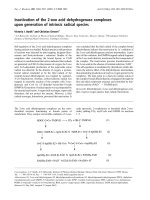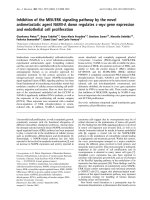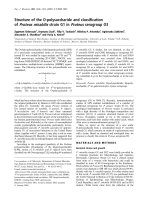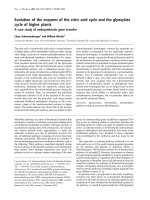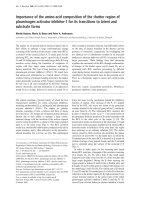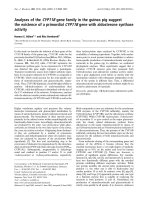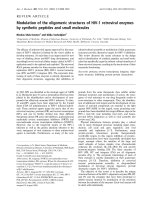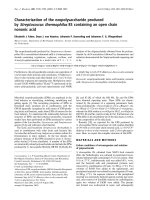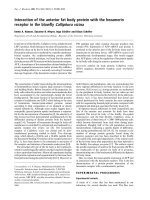Báo cáo y học: "Pharmacology of the critically ill" docx
Bạn đang xem bản rút gọn của tài liệu. Xem và tải ngay bản đầy đủ của tài liệu tại đây (104.7 KB, 1 trang )
Critical Care August 2002 Vol 6 No 4 Grounds
This book, with 16 authors from around the world, discusses
how critically ill patients respond to some of the drugs they are
given. Its aim is to give knowledge and understanding of the
underlying principles of pharmacology as applied to the critically
ill. The authors provide insight into why there may be differences
between the expected response to a drug, or a class of drug,
between critically ill patients and other types of patient.
The book is divided into 11 chapters covering different aspects
of pharmacology as applied to critically ill patients. The first
three chapters concern basic pharmacology, pharmacokinetics,
pharmacodynamics and drug action. The next six chapters
specifically address problems that may be encountered when
failure of a specific organ system may be present, namely renal
failure, hepatic failure, heart failure, gut failure, brain failure and
respiratory failure. There is a chapter specifically concerning
pharmacology in critically ill children. The final chapter gives
excellent guidelines for safe prescribing in the critically ill. Each
chapter is written by an expert (or experts) in their field. Gilbert
Park and Maire Shelly have edited the book in such a way that it
is comprehensive, understandable and logical to read.
Modern intensive care is often much more complex than
providing support for failure of a single organ system. Thus,
those of us who are engaged in the care of critically ill
patients are increasingly called upon to have a
comprehensive understanding of many different organ
systems and of the pharmacology of treatment for failure of
that organ system. Whereas in the past patients may have
received a few drugs to support single organ failure,
nowadays it is not uncommon for patients to be receiving
more than 10 drugs simultaneously to support their various
organ dysfunctions. This myriad of drug therapies requires
not only a comprehensive knowledge of each drug and its
actions, but also an appreciation of interactions and potential
interactions, as well as of how these drugs may not perform
as expected in the critically ill patient.
This book is clearly not intended for the trainee trying to pass
their postgraduate examinations; they need a book that gives
clear and concise information regarding what a drug will be
expected to do in the normal patient. Rather, it is intended for
specialists in critical care medicine who need to know what
will happen when they use familiar drugs in an unfamiliar
situation, or in patients who, by virtue of their critical illness,
do not have a normal physiology. The editors make it clear
that each chapter does not necessarily deal with every single
situation that may occur with every single drug in the critically
ill patient. The chapters describe the principles of changes in
pharmacology with organ failure, and although each chapter
has many examples these are intended to illustrate concepts
rather than to provide comprehensive regimens.
I like this book. It is some years since Gilbert Park wrote a
similar book [1] and much has changed. New research has
led to a much better understanding of many of the problems.
New drugs have brought with them a whole host of new
problems. This book addresses both. It is clearly intended for
the practising intensivist and it meets the needs of the
intended audiences well. I learned a lot of new information
that I will be able to use in my daily work, and I hope that
other readers will too.
Book details
Gilbert Park, Maire Shelly (Eds): Pharmacology of the Critically
Ill: Fundamentals of Anaesthesia and Acute Medicine. Series
editors Jones RM, Aitkenhead AR, Foex P. London: BMJ
Books; 2001. 189 pp. ISBN 0-7279-1221-6 (Pbk)
Competing interests
None declared.
Reference
1. Park GR, Sladen RN (eds): Sedation and Analgesia in the
Critically Ill. London: Blackwell Science; 1995.
Book report
Pharmacology of the critically ill
R M Grounds
Consultant in Anaesthesia and Intensive Care Medicine, Reader in Intensive Care Medicine, St George’s Hospital Medical
School, University of London, UK
Correspondence: R M Grounds,
Published online: 19 June 2002
Critical Care 2002, 6:376
This article is online at />© 2002 BioMed Central Ltd (Print ISSN 1364-8535; Online ISSN 1466-609X)
Keywords: intensive care, pharmacology
